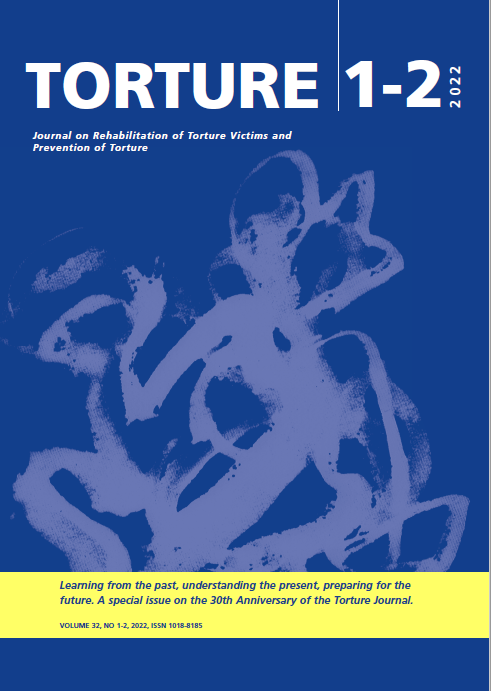Towards a systemic approach for the treatment and rehabilitation of torture and trauma survivors: The experience of STARTTS in Australia
DOI:
https://doi.org/10.7146/torture.v32i1-2.132684Keywords:
torture, rehabilitation, startts, history of anti-torture movement, STARTTS, torture journal, history of tortureAbstract
This paper recovers a text written in 1994 that explored and discussed the complex interaction between the psychological and psychosocial sequelae of exposure to highly traumatic situations in the context of organized violence, and the stresses and demands of the exile and re-settlement process of refugees. The effects on the individual, the family and refugee communities were explored, and a model to address these problems from a systemic perspective, involving action at the individual, family, refugee community, mainstream community and mainstream political structures was put forward. The role of approaches such as individual counselling, group work and community development in this framework, and various issues in the practical application of this model were discussed in the context of STARTTS experience. Looking back, almost 30 years later, the paper has renewed value as it shows the founding theoretical principles and the path to what today is one of the most important anti-torture organizations in the world.
References
Allodi, F., Randall, G. R., Lutz, E. L., Zunzunegui, M. V., Deutsch, A. & Doan, R. (1985). Physical and psychiatric effects of torture: Two medical studies. In E. Stover & E. O. Nightingale (Eds.), The breaking of bodies and minds: Torture, psychiatric abuse, and the health professions (pp. 58-78). New York: W. H. Freeman.
Barudy, J. (1989). A programme of mental health for political refugees: Dealing with the invisible pain of political exile. Social Science and Medicine, 28, 715-727. https://doi.org/10.1016/0277-9536(89)90219-0
Bendfeldt-Zachrisson, F. (1985). State (political) torture: Some general, psychological and particular aspects, International Journal ff Health Services, 15 (2), 339-349. https://doi.org/10.1016/0277-9536(89)90219-010.2190/ATJQ-WAFP-KEU6-3XDW
C.O.D.E.P.U. (Comité de Defensa de los Derechos del Pueblo) (1989). The effects of torture and political repression in a sample of Chilean families. Social Science and Medicine. 28 (7), 735-740. https://doi.org/10.1016/0277-9536(89)90221-9
Cunningham, M. & Silove, D. (1993). Principles of treatment and service development for torture and trauma survivors. In J. P. Wilson and B. Raphael (Eds.), The International Handbook of Traumatic Stress Syndromes (pp. 751-762). New York: Plenum Press.
Figley, C. R. (1987). Post-traumatic family therapy. In Ochberg, F. (Ed.) Post- Traumatic Therapy, Brunner/Mazel, N.Y.
Fischman, Y., & Ross, J. (1990). Group Treatment of Exiled Survivors of Torture. American Journal of Orthopsychiatry, 60 (1), 135-142. https://doi.org/10.1037/h0079191
Goldfeld, A. E., Mollica, R. F. , Pesavento, B. H, & Faraone, S. V., (1988). The Physical and Psychological Effects of Torture. Journal of the American Medical Association, 259, 2725-2729. https://doi.org/10.1001/jama.1988.03720180051032
Gonsalves, C. J. (1990). The psychological effects of political repression on Chilean exiles in USA, American Journal of Orthopsychiatry, 60 (1), 143-153. https://doi.org/10.1037/h0079176
Huntington, J. (1980). Migration as part of life experience. Paper presented at "Cross Cultural issues in Counselling": A NSW Department of Health Cross - Regional Conference, NSW Institute of Psychiatry, October 1980.
Lira, E. & Weinstein, E. (1984). El testimonio de experiencias politicas traumáticas como instrumento terapéutico (The use of testimonials of traumatic political experiences as a therapeutic tool). In E. Lira, E. Weinstein, R. Domingues, J. Kovalskys, A. Maggi, E. Morales, & F. Pollarolo (Eds.), Psicoterapia y Represion Politica. (Psychotherapy and Political Repression). Mexico: Siglo XXI Editores
Lyons, J. A. (1989). Strategies for assessing the potential for positive adjustment following trauma. Journal of Traumatic Stress, 4(1), 93-111. https://doi.org/10.1002/jts.2490040108
Martin-Baro, I. (1989). The psychological consequences of political terrorism. Transcription of the presentation made on January 17, 1989 at the Symposium on the Psychological Consequences of Political Terrorism, Berkeley, California, (CHRICA, Committee for Health Rights in Central America. CHRICA Mental Health Committee: 347 Dolores St., San Francisco, CA 94110).
R.C.T. (Rehabilitation Centre For Torture Victims), (1985). Annual Report 1985. Eks Skolens Trykkeri Aps.
Silove, D., Tarn, R., Bowles, R. & Reid, J. (1991). Psychotherapy for survivors of torture.. In H. Minas (Ed.), Psychotherapy for Survivors of Trauma (pp. 171-193) Melbourne: Cultural Values Mental Health.
Sluzki, C. E. (1979). Migration and family conflict. Family Process. 18 (4),379-390. https://doi.org/10.1111/j.1545-5300.1979.00379.x

Downloads
Published
How to Cite
Issue
Section
License
Copyright (c) 2022 Torture Journal

This work is licensed under a Creative Commons Attribution-NonCommercial-NoDerivatives 4.0 International License.
We accept that some authors (e.g. government employees in some countries) are unable to transfer copyright. The Creative Commons Licence Attribution-NonCommercial-NoDerivatives 4.0 International (CC BY-NC-ND 4.0) covers both the Torture Journal and the IRCT web site. The publisher will not put any limitation on the personal freedom of the author to use material contained in the paper in other works which may be published, provided that acknowledgement is made to the original place of publication.

